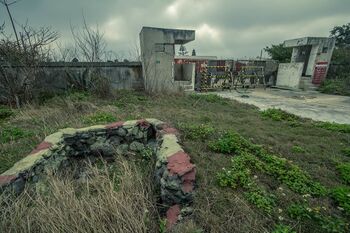Advent Island crisis
| Advent Island Crisis | |||
|---|---|---|---|
 One of the gates of the compound. | |||
| Date | October 1, 2023- October 6, 2023 (5 days) | ||
| Location | Advent Island, Southern Islands Territory, Meridon and surrounding seas- protests across Meridon and globally | ||
| Caused by |
| ||
| Resulted in | See Aftermath | ||
| Parties to the civil conflict | |||
| |||
| Lead figures | |||
| |||
| Number | |||
| |||
| Casualties | |||
| |||
The Advent Island crisis, known also as the Siege of Advent Island, Advent Island incident, or indirectly as the Composite incident, encompasses the armed conflict between Meridonian federal forces against a group referred to as the Advent Island group, or the Advent Island Composites; and the subsequent political, social, and diplomatic upheavals that emerged as a consequence of the events on the island.
Prelude
On June 15th, 2023,
First contact and initial skirmishes
On October 1st, 2023, an Air Forces C14M Iolani tiltrotor tactical transport aircraft, bureau number 74-2122, took off for a demonstration flight from Meridon Air Forces Base Bernic in Taikorea Territory with 3 flight crewmembers and one observer, Air Lieutenant Commandant Aurelia Whitegrove, aboard. The flight was intended to demonstrate the aircraft's capabilities for the newly-assigned Air Sector Southeast staff officer, including a test of its Predictive Threat Avoidance Mode (PTAM), an autopilot that automatically maneuvers an aircraft in order to mitigate or defeat incoming threats. An exercise simulating defensive maneuvers against a surface-to-air missile was to be conducted with the Taga-class frigate Mako Bay.
Takeoff and climb to the area of exercise occurred without incident, however, the test was conducted with PTAM in its full authority mode, which overrode the aircraft's digital flight control system and would bypass design structural limitations in order to defeat the threat. When Mako Bay simulated a missile shot at the Iolani, the aircraft engaged PTAM, which first oversped the engine and then induced a structural overload via a high-G force instantaneous pitch movement, causing the right vertical stabilizer to detach from the aircraft and a propeller blade on the right engine to separate, barely miss the underside of the fuselage, and skip upon the sea floor for nearly a mile before impacting the Mako Bay. The pilots were able to climb the aircraft and conduct a crash landing onto Advent Island at roughly 2:12pm. All three aircrewmen (pilot, copilot, and loadmaster) were killed during the crash. ALCd Whitegrove survived with some injuries, and was captured by forces belonging to the Advent group.
Whitegrove, wearing a standard flight suit and equipment required to operate tactical aircraft such as the Iolani, was equipped with a survival radio that automatically activated after the crash. During a moment of consciousness under custody, a member of the Advent group who later identified herself as Mélisande met with Whitegrove, and claimed responsibility for the 15 Rush. The radio was able to capture and transmit their conversation, which was forwarded from the Mako Bay to senior command officials, who began immediately mobilizing to react.
Federal forces consisting of Army helicopters from Himona Garrison and agents from the Domestic Security Agency landed on the island before sundown.